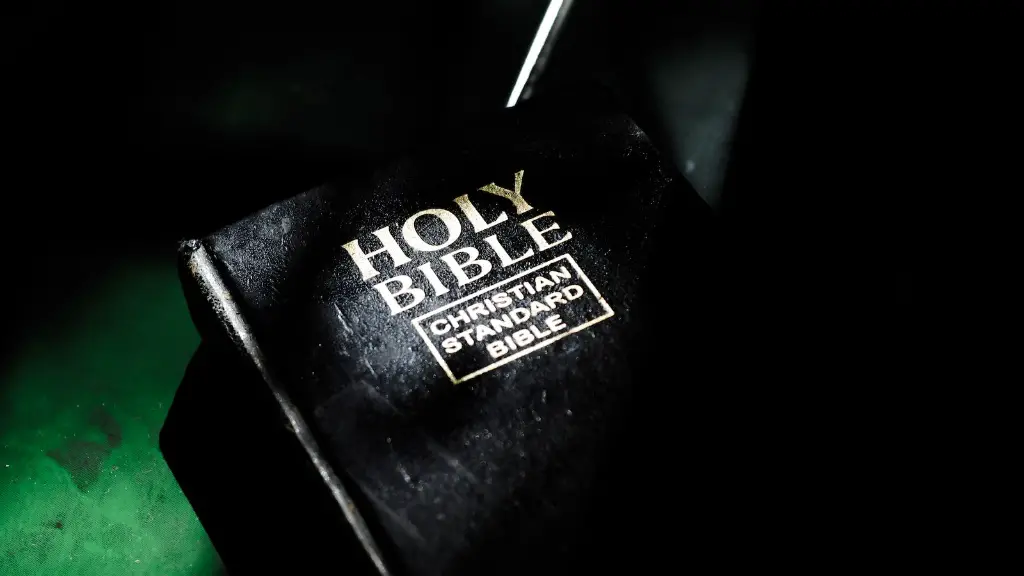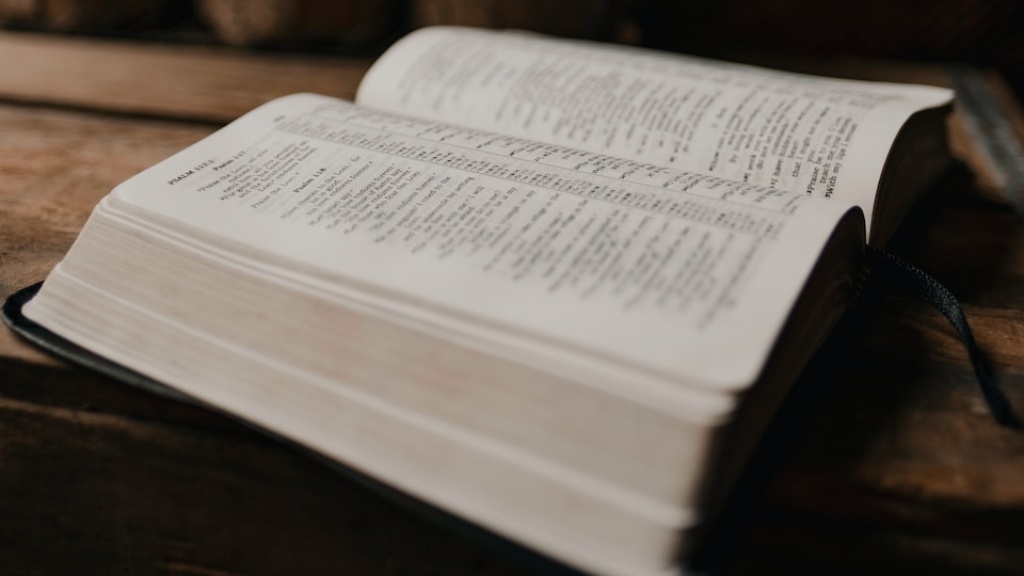The Bible can be overwhelming for beginners. There are 66 books, 1,189 chapters and 31,102 verses. So where should you start?
One approach is to simply read the Bible from cover to cover. Start with Genesis and read straight through to Revelation. This may not be the most exciting way to read the Bible, but it will give you a good overview of what the Bible is all about.
Another approach is to pick a theme and read about it throughout the Bible. For example, you could read about God’s love by starting in the Old Testament with the book of Hosea and reading about God’s unfailing love for His people. Then read about Jesus’ love for us in the New Testament, starting with the book of John.
Or you could focus on a specific character in the Bible and see how he or she changed throughout the course of their life. A great example is King David. You can read about his righteousness in the book of 1 Samuel, his sin in the book of 2 Samuel, and his repentance in the book of Psalms.
Whichever approach you take, just remember to pray and ask God to help you understand His Word.
There is no one answer to this question as everyone is at a different place in their journey of faith. However, some good starting places for beginners are the book of John or the book of Romans in the New Testament. Another helpful resource is a Bible study guide that can help you understand the Bible better.
How should a beginner start the Bible?
The Gospel of Mark is a great choice for first time readers of the Bible. It is the shortest of the four Gospels, and is thought to be the earliest account of the life of Jesus Christ. As such, it has a helpful urgency to the way it tells the story of Jesus’ life, death, and resurrection.
This is so true! Genesis is such an important book and it is essential to read it in order to understand the rest of the Bible and our own story.
What Chapter Should I start on in the Bible
The Gospels are four accounts of the life and teachings of Jesus Christ. They are central to our faith because they tell us about the historical figure of Jesus Christ, who is God Himself. These Gospels give us an insight into who Jesus was and what He did while He was here on earth.
The Gospel of John is an excellent book for new believers to start reading. It gives a good understanding of who Jesus is and what His ministry is about. This book is also a great resource for those who want to deepen their understanding of the Christian faith.
How do I start my daily bible study?
There is no one-size-fits-all answer to the question of how to develop a daily Bible study habit. However, there are a few general tips that may be helpful.
#1 – Don’t Pick a Study, Pick a Topic
One mistake that many people make when trying to develop a daily Bible study habit is to choose a particular study method or program to follow. While there is nothing wrong with using a study guide, it is often more helpful to simply choose a topic that you want to learn about. That way, you can tailor your studies to your own interests and needs.
#2 – Use a Guided Journal
Another helpful tip is to use a guided journal. This can be an excellent way to structure your studies and keep yourself accountable. There are many different types of guided journals available, so be sure to choose one that will work well for you.
#3 – Dig Into Sermon Notes
If you are someone who attends church regularly, another great way to develop a daily Bible study habit is to make use of your sermon notes. Many times, the pastor or preacher will provide an outline of the main points covered in the sermon. This can be a great starting point for your own personal
There are a number of different methods that can be used when engaging in a Bible study. The following is a 7 step method that can be used in order to gain a better understanding of the text:
1. Read through the chapter carefully
2. Seek to find its main subject or subjects
3. Give each chapter a title that suggests its main content
4. Reread the chapter and make a simple outline
5. Take note of any practical or theological problems in this chapter
6. Research any difficult words or concepts
7. Engage in discussion with others about what you have learned.
What is a good Bible study plan?
The Bible is a complex book, with many different stories and characters. Reading it in chronological order can help you understand the events and people in a new light. Here are some tips for reading the Bible chronologically:
Start in Genesis: This is the first book of the Bible, and it tells the story of creation.
Psalms: The Book of Psalms is a collection of songs and prayers. Reading them in order can help you understand the development of worship in the Bible.
Matthew: The Gospel of Matthew tells the story of Jesus Christ. Reading it chronologically can help you understand his teachings in relation to the events of his life.
Acts: The Book of Acts tells the story of the early church. Reading it in chronological order can help you understand the growth of Christianity.
Old Testament: The Old Testament is the part of the Bible that was written before the coming of Jesus Christ. Reading it in chronological order can help you understand the history of the people of Israel.
New Testament: The New Testament is the part of the Bible that was written after the coming of Jesus Christ. Reading it in chronological order can help you understand the development of Christianity.
SOAP is a great method for reading and applying God’s word to our lives. It helps us to focus on a specific passage and observe what we can learn from it. We can then apply what we have learned to our own lives and pray that God will help us to live according to his will.
Where do I start to read the Bible to get closer to God
The New Testament is an excellent place to start reading the Bible. The first four books (Matthew, Mark, Luke, and John) are accounts of Jesus’ life and ministry and are often referred to as the gospels. Reading the gospels is like reading the journals of four friends who went on a road trip together. You will get a first-hand account of Jesus’ ministry, his miracles, and his teachings. You will also get a sense of his character and what he was like as a person.
It is important to first memorize the order of the books in the Bible before diving into studying them. A great way to do this is to read as much as you can about each book, memorize facts about them, and write summaries of each book along with your thoughts. It is also beneficial to discuss the books often with others and listen to lectures about them in order. By taking these steps, the process of memorizing the order of the books in the Bible will be both enjoyable and educational.
How do you study the Bible in 3 simple steps?
When studying the Bible, it is important to take a three-step approach in order to fully understand the text. The first step is observation, which answers the question of what the text says. The second step is elucidation, which answers the question of what the text means. The third and final step is application, which answers the question of what the text means to the reader. By taking all three of these steps, the Bible can be studied more effectively and deeper levels of meaning can be discovered.
This plan is perfect for someone who wants to read the entire New Testament, but doesn’t have a lot of time to dedicate to reading scripture every day. By only reading for 5 minutes a day, you can complete the entire New Testament in just 25 days!
How do I choose a Bible reading plan
There is no one “right” way to read the Bible, and the best way to find a Bible reading plan that works for you is to experiment with different plans until you find one that suits your needs and schedule. Here are a few questions to ask yourself when choosing a Bible reading plan:
1. How much time do I intend to spend reading the Bible daily?
2. What is the best time of day for me to read the Bible daily?
3. How many chapters do I want to read in a day?
4. Do I plan to use any Bible study methods as I read or simply read and reflect?
5. What translation of the Bible do I want to use?
According to the article, “What Does It Say? What Does It Mean? What Does It Mean For Me?”, we are supposed to think about what a piece of text says, what it means, and how it affects us personally. This is especially important when we are reading something for school or work, or when we are trying to understand a complex issue. By taking the time to think about all three of these things, we can make sure that we are really understanding what we are reading.
What questions should I ask during Bible study?
1. What does this say about God?
2. What does this say about the human condition?
3. What does this say about God’s provision in Christ for the human condition?
4. What response does God want from me?
5. What response does God want from the church?
This is a helpful method for memorizing Scripture. By reading the verse through several times and saying the reference aloud, you will be better able to grasp the verse as a whole. Additionally, by discussing the verse with God in prayer, you will be able to more easily memorize it.
Warp Up
The best place to start for beginners is in the book of John.
There is no one answer for this question as everyone has different preferences. However, a good place to start for beginners is reading Genesis, the first book of the Bible. This book tells the story of creation and the beginning of humanity. Another option is to start with the Gospels, which tell the story of Jesus’ life, death, and resurrection. The important thing is to find a version of the Bible that is easy to understand and read, and to start reading slowly and carefully.





